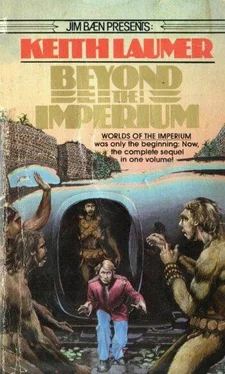I had seen it before, but it was a thing that could never lose its fascination. All around me, as the hours passed, the world changed and flowed. I knew now that what I was seeing was a simultaneous sequences of A-lines, each differing only slightly from the next, like the frames of a movie film. Nothing really moved; no normal time elapsed during a transdimensional crossing. But the eerie pseudo-activity of E-entropy went on; plants jostled each other for favorable positions; vines attacked trees; weeds swelled and crowded out other weeds. The ivy-covered walls of the palace shrank, broadened, became a fortress ringed with a moat. The walks shifted position, slid away, became footpaths. The trees moved back, gliding slowly through the turf that parted like water, until the shuttle was perched in an open field edged by an ancient forest. The fort had become a stone manor house, with mansard roofs and chimneys poking up into the unchanging sky; the chimneys drew together and merged, became towers of brick with castellated tops.
Suddenly, the hum of the drive whined down-scale and ceased. The scene stabilized. I was looking across a tilled field of grain toward the lone house occupying the top of a low rise among tall trees.
A high stone house with brick towers. Bricks would be red in normal light. Out of all the possible destinations in all the Universes, Roosevelt had led me to the house of Henry Planget.
I waited until full dark before I switched the shuttle -back to full-phase and stepped out, then shifted it back. The soft boom\ of imploding air had a lonely sound of finality.
For the past hour, a steady stream of men had come and gone around the big house. Couriers had galloped up on horseback, and others had ridden away down the unpaved road with full saddlebags slapping at their mounts’ flanks. Lights burned in all the ground-floor windows. Sentries paced in front of the main door.
Everything about the place spelled military headquarters. Somewhere inside, Roosevelt would be cooking up the last ingredients of his grand scheme for the world.
I skirted the house, came up in the shelter of a row of poplars until I could see through the nearest set of casement windows. A group of men in ornate green uniforms clustered around a table on which a map was spread, under a gas-burning chandelier. Roosevelt wasn’t among them. It was the same in the next room, except that the men wore plain khaki and were working over what might have been manning documents or supply lists. I worked my way halfway around the house, using the hedges for concealment, before I found my man. He was sitting alone at a table, writing rapidly with a ball-point pen—a curious anomaly in the old-fashioned setting. He was smiling a little as he wrote. There was a small cut on his forehead. He was still wearing the fancy outfit he had donned for the ceremony back in New Normandy, now stained and powder-burned. It seemed the general had seen some close action before he had left the scene of battle.
He finished writing and left the room. I closed in and checked the windows. It was a mild evening, and they stood open half an inch. Ten seconds later, I was inside.
I listened at the door, heard nothing, opened it, and took a look along the papered hallway glowing softly in the light of a single gas jet. A sentry stood at the far end, all shiny leather and brass, with a musket over his shoulder. I tried to pretend I was a shadow moving along the hall, sliding into the recess of a stairwell. He never turned his head.
There was red carpeting on the stairs, a polished mahogany rail. On the landing, I gave a listen, then went on up into a dark corridor, door-lined. I was standing there, waiting for instinct to whisper instructions in my ear, when I felt a touch at the hip. I came around fast, and my hand went to the sword-hilt before I understood. The touch had been the sword, tugging gently at my side. I drew it, following the direction of the pull.
At the end of the corridor, three steps led up to double doors of carved oak. I pushed through them, stood in moonlight shining through a rose window. It wasn’t a room that I had ever seen before—and yet it was. I knew, without knowing how I knew, that it was the analog of the chapel from which Roosevelt had stolen the reliquary box. This room was smaller, simpler, almost unadorned. But somehow, in the abstruse geography of the Net of alternate reality, it occupied the same position. The altar under the high window consisted of two heavy oak uprights with a flat slab of rough stone across them, but somehow, it was the same altar. In the dim light, it looked like an ancient sacrificial block. I started forward and the door made a soft sound behind me. I turned, and Roosevelt stood there. His black eyes seemed to blaze across the darkness at me, as armed men spread out behind him.
“You see, Plantagenet?” he said softly. “Struggle as you will, your fate must deliver you into my hands!”
“I misjudged you when we met,” Roosevelt said. “And again, in New Normandy. You should have seized on the chance to escape, filled with the zeal to set a nation free. The countryside would have risen at your call; you’d have ridden into glory with your followers at your back and the bright sun overhead. Why didn’t you ?”
“You’re a clever man, Roosevelt,” I said. “But not clever enough to play God. Men aren’t cardboard cutouts for you to arrange to suit yourself.”
“Men are tools,” Roosevelt said flatly. “As for you—you’re a tool that turns in the hand, and your edges are surpassingly sharp.” He shook his head. “You’re supposed to be a man of emotion and action, Plantagenet, not thought!”
“Stop second-guessing me, Roosevelt. Your scheme’s blown up in your face. You’ve failed—the way your father failed with Henry Planget.” It was a shot in the dark, just something to say. For a moment, he looked startled. Then his teeth flashed in a smile.
“It was my grandfather,” he said. “I wonder how you learned of that? But it doesn’t matter now, does it? You’ve come here, to the one place you had to come to—and found me waiting and ready.”
“Not so ready. I could have shot you while you were writing at your desk.”
“I fail to see the weapon.” He was still smiling an almost gentle smile. “No, Plantagenet, it’s not your destiny to shoot me in the back. We’ll have our meeting face to face—and the fateful time is now.” He drew the heavy longsword slung at his side. The light winked on the jewels that crusted the pommel and grip and pas-d’âne. The men behind him stood silent, drawn guns in their hands.
“You like to talk about fate, Roosevelt,” I said. “It’s a lot of hot air. A man determines his own fate.” I was watching the long blade, ready to ward off a blow with the broken weapon in my hand. Roosevelt looked at it and laughed, a low chuckle.
“Like your blade, Plantagenet, you’re incomplete! You know a little—though even that little surprises me—but not enough. Don’t you recognize the weapon you face?”
“It’s a fancy piece of iron,” I said. “But a weapon is as good as the man behind it.”
“Look on Balingore!” Roosevelt held the sword out so that the blade caught the light. It was a slab of edged and polished steel, six feet long, as wide as my hand, and Roosevelt’s brawny arm held it as though it were a stick of wood. “It was forged for your once-great ancestor, Richard of the lion-heart. It served him well—but he was a greedy man. He went too far, grew fat on gold and wine. Richard Bombast, they called him in the end. He lay drunk in his chamber while the French attacked the walls of London and his people opened the gates to them. He bought his life with this. He handed it, hilt-first, to the Dutch mercenary who led the forces of Louis Augustus, and swore the submission of himself and his house, to the end of time!”
Читать дальше












